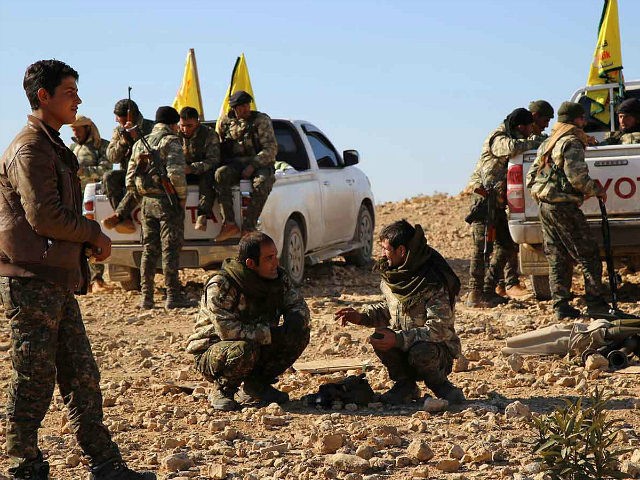The U.S.-backed Syrian Democratic Forces (SDF) group, led by the Kurdish YPG but boasting a variety of Arab and Christian militias, is signaling that it can capture the city of Raqqa from the Islamic State with support from the United States and pointedly without help from Turkey.
Turkey has been equally pointed in its insistence that the Kurds stay away from Raqqa, but recent battlefield gains for the SDF and the arrival of U.S. Marine artillery in the area might have tipped the argument away from Ankara. As Reuters describes it, the battle plan for Raqqa is still a work in progress:
The SDF says it ruled out any Turkish role during meetings with U.S. officials last month, though Turkey said on Thursday no decision had been made yet and the U.S.-led coalition said a possible Turkish role remained a point of discussion.
“The number of our forces is now increasing, particularly from among the people of the area, and we have enough strength to liberate Raqqa with support from the coalition forces,” Jihan Sheikh Ahmed, an SDF spokeswoman, said.
Turkey views the YPG as an extension of the Kurdistan Workers Party (PKK), which has fought a three-decade insurgency against the Turkish government.
An SDF spokesman told Reuters on Thursday he expected the forces to reach the outskirts of the city within a few weeks. Its forces began the operation to encircle Raqqa in November.
“We have information that the enemy is moving part of its leadership outside the city, as it is also digging tunnels under the ground. We expect they will fortify the city and the terrorist group will depend on street warfare,” Ahmed said.
Unfortunately, ISIS absolutely will depend on street warfare, which increases the risk of civilian casualties, friendly fire incidents, and not-so-friendly fire incidents.
Turkey is already complaining about U.S. plans to partner with Kurdish militia to topple Raqqa, as reported by USA Today:
“This operation should be carried out jointly by the U.S. and Turkey,” [Turkish Prime Minister Binali] Yildirim said during a lunch with several American journalists at his office compound in Turkey’s capital. “You cannot use one terror organization to fight another terrorist organization.”
He warned that if the United States insists on working with the Kurds in Syria, “the friendship between the United States and Turkey will be damaged.”
Yildirim said Turkey can prove that weapons the U.S. supplied to Kurdish allies have been used against Turkish forces by Kurdish separatists inside Turkey.
U.S. spokesman Col. John Dorrian insisted the U.S. military has seen no evidence Kurdish forces are “doing anything to threaten Turkey,” and that the United States remains open to a “Turkish role in liberating the city.”
However, Dorrian stressed the need for strong Arab participation in the Raqqa operation and noted the Turks have been having trouble locking down the much smaller city of al-Bab, while the Kurds have made great progress at cutting off major roads and isolating the Islamic State forces in Raqqa.
Dorrian also stated that the Raqqa operation has been fast-tracked because the United States believes ISIS will be “overwhelmed” by simultaneous assaults on its strongholds in both Syria and Iraq, where the city of Mosul has already been partially reclaimed.
USA Today’s report observes that Kurdish militias and their Arab allies have clashed with Turkish-supported Syrian forces near the city of Manbij, but Syrian forces recently displaced the Kurds with Russian air support. Turkey would now have to go through the Syrians and Russians to get at the Kurds.
That sounds like it might be more of a feature than a bug in the Raqqa battle plan. In fact, the Financial Times notes that U.S. forces hung American flags on the gates of Manbij to send a signal that might prevent “a possible skirmish between the varied forces arrayed around the town.”
Yildirim sourly dismissed the U.S. action in Manbij as a “flag race” and said, “it is a pity that it has come to this.”
Turkey’s concerns will not be laid to rest by Kurdish representatives talking about their plan to seize Raqqa and use it as a bargaining chip in negotiations with Damascus.
“Raqqa for us is a strategic matter. If we take it with the international coalition, we will be a force to be reckoned with in the region. We’ll have real weight in the Middle East,” one Kurdish representative told the Financial Times.

COMMENTS
Please let us know if you're having issues with commenting.